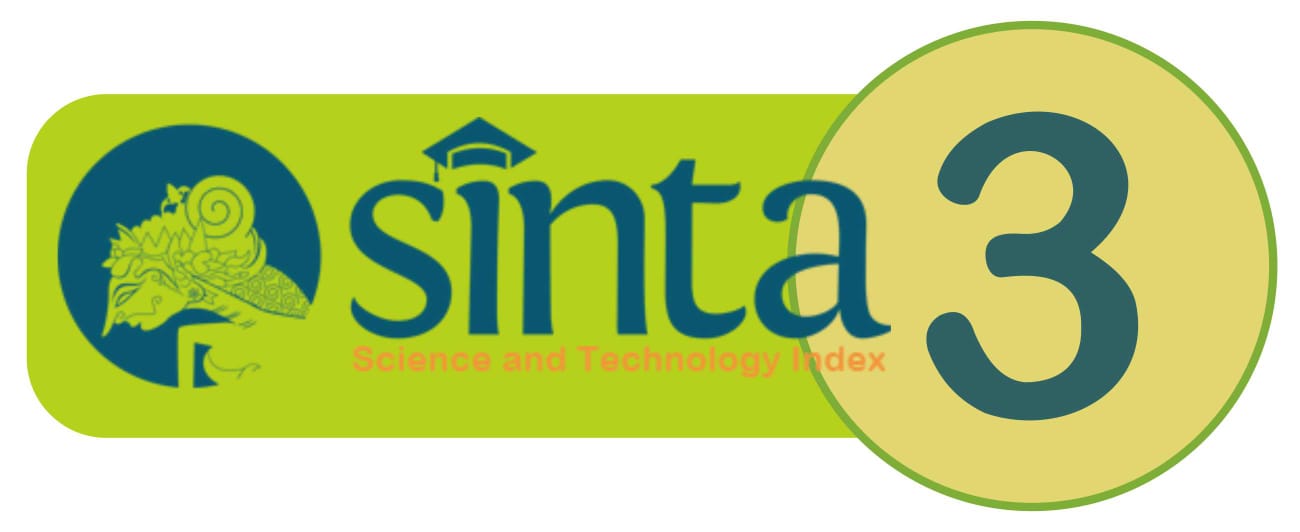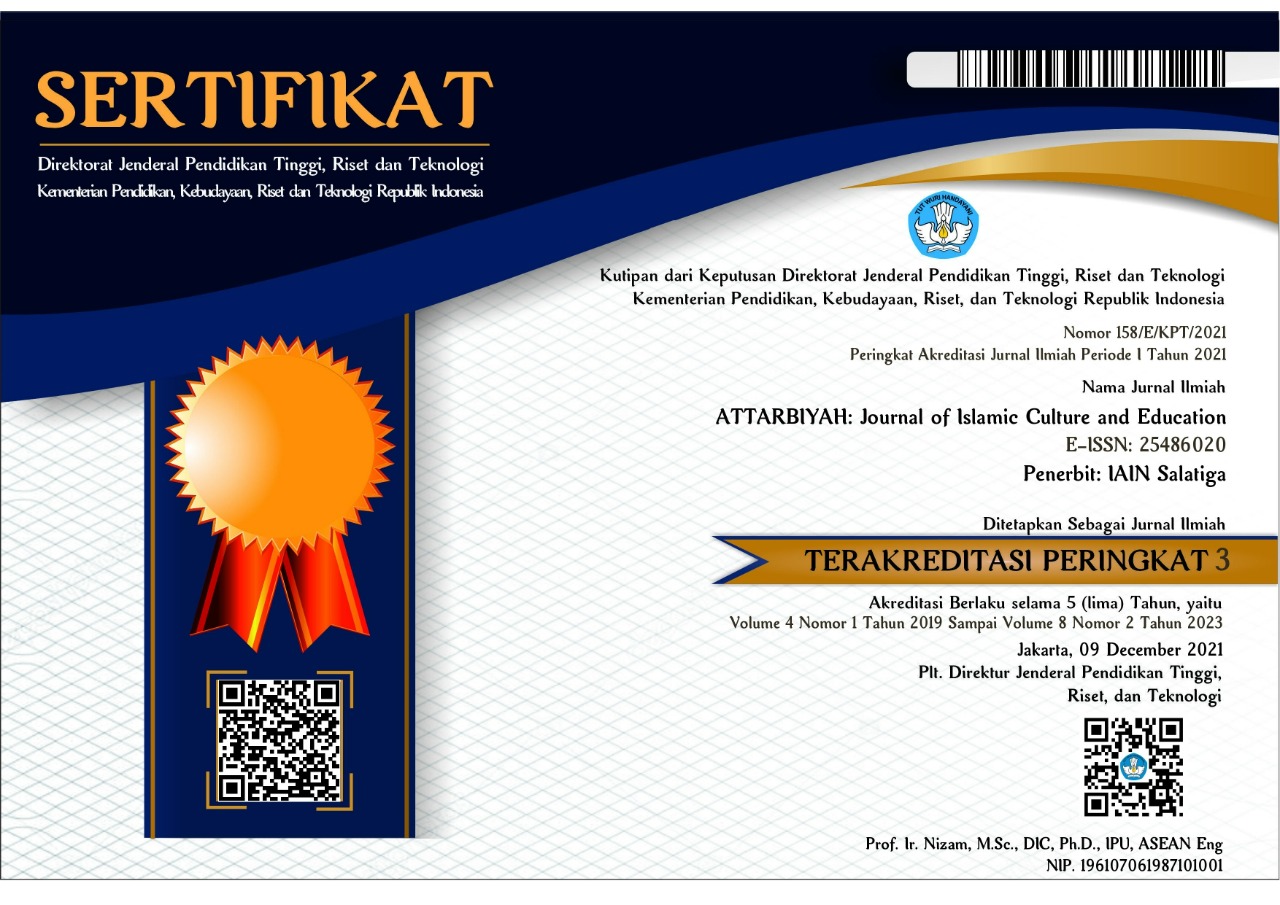Integration of religious thought and student learning ethos in the covid-19 pandemic
Abstract
This study discusses religious thoughts that affect the learning ethos of students during the Covid-19 pandemic, which has formed a new culture in the learning process that is carried out online (on the network). This study uses a qualitative method with data collection techniques in observation, interviews and literature review. In contrast, the data analysis method used is an analysis of the religious ideas of Jabariyah, Qadariyah, Ahlu Sunnah Waljama'ah in the indicators of a predetermined learning ethos. This research has shown the results that: first, the level of religious understanding of students has shown a significant influence on learning ethos during the covid-19 pandemic, second, there is a change in the learning ethic of students seen from indicators/moral aspects (attitudes, behaviour, habits). Al-Jiddu (resistance/persistence, sincerity), al-Thariiq (method), AlHimmah (interests, ideals), and al-Shobru (patience). Third, the flow of Ahlu Sunnah Waljama'ah thought in the socio-cultural environment of the Purwakarta community also contributed to strengthening religious literacy during the covid-19 pandemic. Thus, the influence of religious thinking on the learning ethos of students has implications for the intellectual repertoire in the theological and social fields and will shape academic attitudes and culture in their participation in strengthening community religious literacy
Keywords
Full Text:
PDFReferences
Al-Syahrasytaniy. (2005). al-Milal wa al-Nihal. Dâr al-Fikr.
Amin, A. (1965). Fajr Islam. Al-Nahdah.
Assuyuthy, J. (1991). Wahasyiyatul Imami Al Imami Al-Sindy. Darul Ma'rifah.
Asy'arie, M. (1992). Manusia Pembentuk Kebudayaan dalam Al-Qur'an. Lembaga Studi Filsafat Islam.
Bashori, M. dan Mulyono. (2010). Studi Ilmu Tauhid/Kalam. UIN Maliki Press.
Drajat, M., M. R. Effendi. (2015). Etika Ptrofesi Guru. Alfabeta.
Effendi, M. R. (2021). Teologi Islam; Potret Sejarah dan Perkembangan Mazhab Kalam. Literasi Nusantara.
Effendi, M. R. & S. Nurpratiwi. (2021). Hubungan Keberagamaan dan Perilaku Altruistik Mahasiswa. Al-Afkar, 4(1), 83–97. https://doi.org/https://doi.org/10.31943/afkarjournal.v4i1.181.
Effendi M.R., Sari Narulita, S. N. (2021). Penguatan Kapasitas Softskill Guru Pondok Pesantren Nurul Huda Dalam Upaya Peningkatan Etos Belajar Peserta Didik di Masa Pandemi Covid-19. Sivitas : Jurnal Pengabdian Dan Pemberdayaan Masyarakat, 1(2), 41–51.
Hasbi, M. (2015). Paham Qadariyah dan Jabariyyah Pada Pelaku Pasar Pelelangan Ikan Bajoe Kabupaten Bone Propinsi Sulawesi Selatan. El-Harakah, 17(1), 36–51.
Ihsanudin. (2020). Presiden Jokowi Teken Keppres Tetapkan Wabah Covid-19 Bencana Nasional.
KOMPAS.Com.https://nasional.kompas.com/read/2020/04/13/
/presiden-jokowi-teken-keppres-tetapkan-wabah-covid-19-bencananasional.
Maksun, A. (2011). Pluralisme dan Multikulturalisme Paradigma Baru Pendidikan Agama Islam di Indonesia. Aditya Media Publishing.
Melawati, N, Abbas A, Toto S. (2016). Peran Guru dalam Membina Etos
Belajar Melalui Mata Pelajaran PAI di Sekolah (Studi Kasus di SMA Negeri 1 Susukan Cirebon Kelas X Semester Genap Periode Tahun 2014-2015). Tarbawy, 3(1), 100–106.
Nasution, H. (2002). Teologi Islam. UI Press.
Nurpratiwi, S., M. R. Effendi, Amaliyah (2021). Improving Religious Literacy Through Islamic Religious Education Course Based On The Flipped Classroom. Istawa, 6(1), 16–29.
https://doi.org/http://dx.doi.org/10.24269/ijpi.v6i1.3107.
Syaikh Ibrahim Bin Ismail. (1978). Syarah Ta'liim al-Muta'allim Thariiq
al-Ta'allum. Darul Ilmi.
DOI: https://doi.org/10.18326/attarbiyah.v6i2.97-111
Refbacks
- There are currently no refbacks.

ATTARBIYAH: Journal of Islamic Culture and Education by http://attarbiyah.iainsalatiga.ac.id/ is licensed under a Creative Commons Attribution-ShareAlike 4.0 International License
----------------------------------------------------------
ATTARBIYAH : Journal of Islamic Culture and Education IAIN SALATIGA p-ISSN: 0215-9996, e-ISSN: 2548-6020




